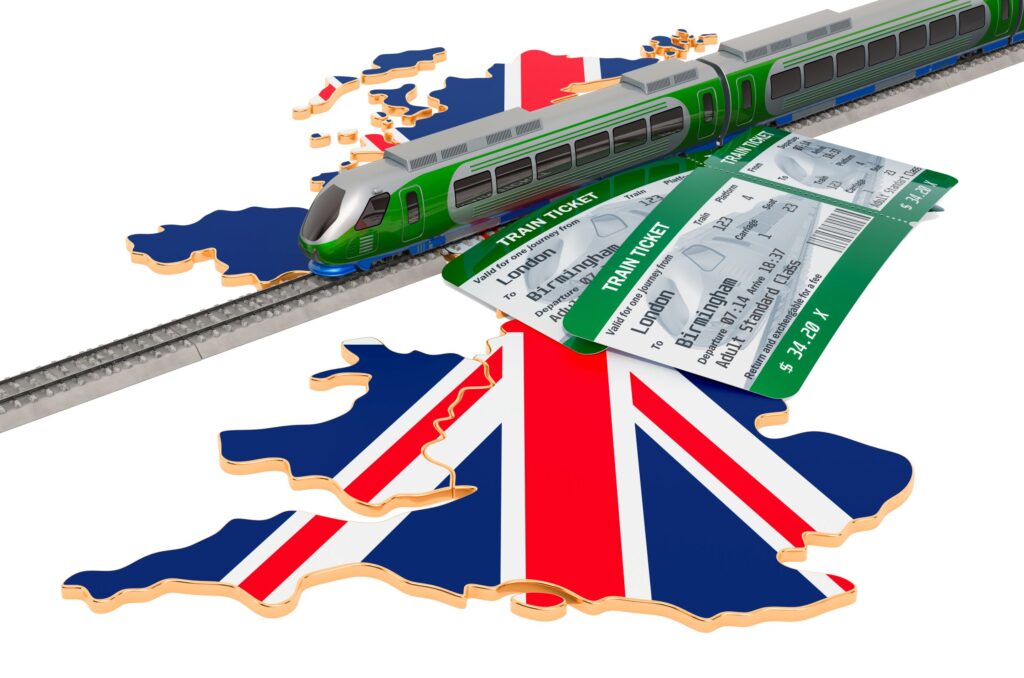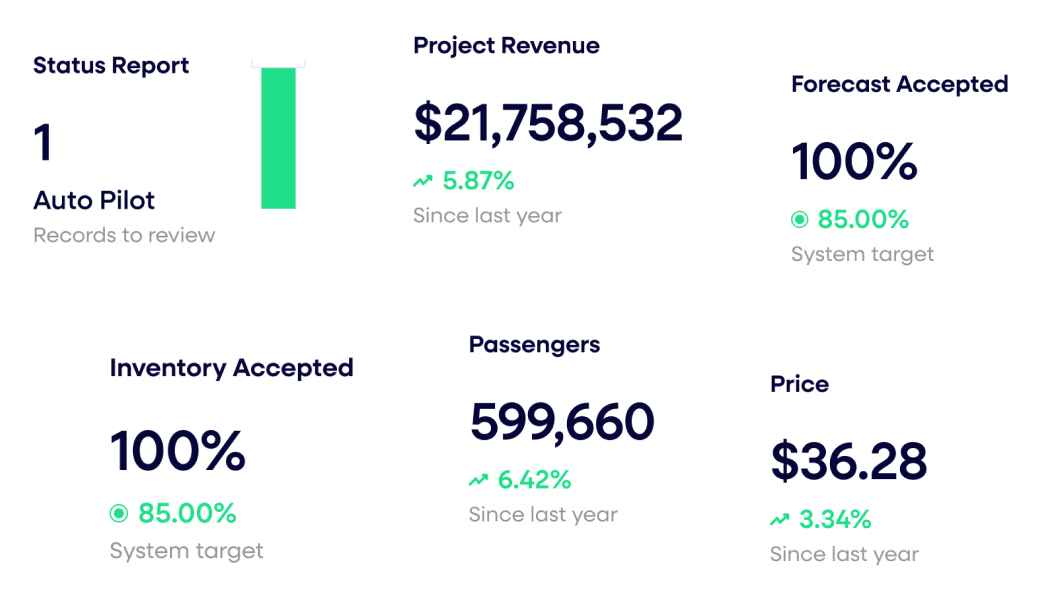How Passenger Rail Revenue Managers Can Be Ready for the Coming “New” Normal

As I write this article in the third week of April, the COVID-19 crisis continues to suppress passenger rail demand in the UK and Europe, with rail travel down by 60% or more. Most rail operators have essentially suspended their typical Revenue Management activities and are offering primarily (if not exclusively) flat-priced fares.
There’s not a clear timeline for a return to a new “business as usual”. The rail Revenue Managers we’re speaking with expect a gradual, phased return of customers as shelter in place restrictions are relaxed, and we are starting to see that in countries like Denmark.
However, business conditions are unlikely to be just as they were before the pandemic. We expect the novel coronavirus to have lasting effects on passenger rail and how operators do business.
See how modern rail operators turn pricing into a powerful revenue growth engine.
During these unprecedented times, where should you, a Revenue Management leader, and your team focus your attention and efforts? How can you ensure you’ll be ready for the “new” normal, whatever that looks like, as we emerge from this crisis period?
On the one hand, it’s crucial that you maintain your focus on the core tenets of an efficient, results-oriented Revenue Management department: your people, your processes, and your systems. On the other hand, you’ll need to be adaptable and shift how you manage each “leg” of the three-legged Revenue Management “stool” as we navigate the pandemic and, eventually, emerge from it.
In this article, I’ll share the best practices for successful Revenue Management that we’re advising our rail-operator partners to adopt, as well as what we’re learning from them.
Your People: Inspire Them, Provide Structure, and Keep Them Involved
In speaking with our rail partners, I’ve been heartened to learn that Revenue Management teams are showing resolve, focus, and determination. This is hardly surprising since, as Revenue Analytics Chairman Robert Cross noted in a recent article, Revenue Managers are by nature comfortable with uncertainty and by training accustomed to shifting their viewpoints when the facts on the ground change.
And yet it’s only natural for anyone to be rattled when conditions change as rapidly and drastically as they have during the COVID-19 crisis, and when they impact our personal lives as much as this crisis has. That’s why effective leadership from Revenue Management executives and managers, as well as the rest of the organization, is more important than ever.
Inspire Your Team Through Thoughtful, Visible Leadership
During these challenging times, it is important to plan your response from the heart as well as from the head.
Each member of your team is likely challenged by their own unique situation, and it’s important that you as a team leader recognize each person’s individual circumstances and demonstrate true concern and empathy for what they may be going through and how it may be impacting their work.
Working remotely with the additional responsibilities of supporting kids’ schoolwork, being in confined quarters, and the like creates anxiety in most people. There is also a great deal of uncertainty over what will happen next.
Now is the time for leaders to check in frequently on their direct reports. It’s critical to identify where people are showing higher levels of stress and then provide the appropriate support and reassurances that help to create the kind of positive environments teams need now more than ever.
Emphasizing team members’ communications with each other also helps provide a social connection to others and a sense of community. These types of support, along with a continued emphasis on the importance of their activities, will help to reinforce a sense of purpose for each team member.
Also, studies have shown that people often feel more loyalty to their leaders than to organizations. So, by providing support and understanding during this crisis time, you will be there for your team and they will be there for you as the ever-changing environment forces new decisions and actions to be quickly and effectively implemented.
As for managing from the head, now more than ever is the time to pay attention to management fundamentals. When it comes to decision-making, aim for speed over elegance. Decisions must be thoughtful and prudent but will also need to be made faster than before to maximize the effectiveness of everyone on your team.
Structure, Expectations, and Focus on the Future
Now is a trying time, so it is even more critical to be sure you’re establishing a clear structure with defined expectations for what your team should be focusing on and seeking to accomplish.
Your team’s normal tasks may not be as critical right now, so make sure they have clear guidance as to their near-term priorities, whether that is getting revised train schedules in place, identifying new business intelligence needed going forward, or other needs.
Additionally, you will need to get people focused on the future. As discussions start about “reopening the economy”, you should be talking with your team about what that will mean for your business.
Some potential scenarios center around ramping rail travel back up in phases, in order to help maintain social distancing. That could mean starting with seating at a maximum of 20% capacity, then increasing to 50% or more over time. As noted earlier, we are seeing this in Denmark now, so this is the time to determine what such a scenario would mean for your pricing approaches.
Also, historically, train schedules have been released 12–24 or more weeks in the future. However, recently the schedule releases have been slowed due to the uncertainty around travel. As schedule releases start to extend further into the future, it will be important to have established your advance pricing strategy and to have mapped out how it will evolve.
Involving your team in all the decisions outlined above will help everyone align on the path forward. The plans that you put in place now will set expectations among your customers and influence your future decisions, so it is important to ensure that you and your team have a common vision.
Capture Key Learnings About Your Team
And finally, Revenue Management leaders would do well to begin evaluating their teams now, in light of their response to this crisis, and think about how they can contribute in different, perhaps more effective ways as “new” normal conditions resume. For example:
- Crisis situations create stress, yet some people answer the call in stressful situations. Pay careful attention when members of your team demonstrate the kind of leadership qualities they might not have shown before. Encourage them and help them to develop those skills.
- Creativity is another area that may raise its head. Members of your team may show additional analysis skills or communications skills that you were not aware of that will help them be more effective in their roles now or for the company in the future.
Your Processes: Focus on Immediate Needs and Becoming Stronger Post-Crisis
In the near term, operators must modify processes to accommodate these crisis conditions. After you have addressed immediate needs, then begin to focus your team’s attention on the process changes you’ll need to make as the crisis eases (it will likely be in stages) and once conditions move to the “new” normal.
The one thing that everyone is fairly certain about is that things will not be the same as they were before, so we should not expect all the processes to stay the same.
In response to unprecedented conditions like these, leaders should involve their teams in decisions around process modifications and changes to address the new opportunities. Your team will have unique perspectives and insights around these areas, so be sure to empower them to help make these transformations.
Align on Current Pricing Strategy
Aligning on pricing strategy and process is just as important now as it is during normal conditions.
Initially, operators have mostly suspended traditional Revenue Management practices, instituted flat pricing, taken a public-service orientation, and reduced service capacity. When travel capacity is reduced, it’s important to consider your customers’ perspectives as well as larger market considerations.
As our Chairman, Robert Cross, observes in another recent article focused on pricing in times of scarcity, it’s critical to avoid any pricing moves that your customers could perceive as price gouging, as customers have long memories. And as we emerge from crisis conditions and move back toward typical Revenue Management, it will almost always be more important to build goodwill and loyalty over the long term than to charge what the market will, theoretically, bear during times of shortage.
Additionally, now is also not a time to look to expand market share by lowering prices. With only essential travel being encouraged at this time, price reductions will not stimulate demand. Moreover, doing so would not respect the spirit of current shelter in place restrictions.
Monitor Travel Patterns and Be Prepared to Respond
More regular travel patterns will return only gradually, and it’s not clear when that will begin to happen. In addition to paying close attention to broader governmental directions, it’s essential to keep a close watch on travel patterns so you will be prepared to respond as conditions change.
At this time the questions being asked repeatedly are, “What are the travel patterns we should be seeing now? What should we plan for?” Some things to consider include (and this is not an exhaustive list):
- Monitoring passenger volumes to understand when non-business travel is starting to pick back up (for example, an increase in weekend trips for short getaways). Bear in mind that in previous downturns, leisure segments have come back first, since there’s pent-up demand to go places and do things. Business segments, by contrast, tend to continue with cost-minimization coming out of downturns.
- Coordinating with the Operations department to align on where demand warrants an increase in capacity running on given networks.
- Being ready to identify opportunities for pricing incentives. For example, when appropriate, work with your Marketing team to provide packages that encourage leisure travel. Because that segment is more price sensitive, bundled-service offerings (like Internet access in standard class) are especially attractive to these travelers.
Plan for a Gradual Return to a “New” Normal
Now is the time to plan for how you will transition back toward a pre-crisis type of Revenue Management operation.
A key point here is to identify your potential options for handling the future scenarios you think most likely. It’s important to dedicate time away from crisis management and think carefully about making conscious choices—as opposed to reacting in the moment—so you’ll be ready when emergency conditions begin to ease.
A key pitfall to avoid is going back to the exact same pre-crisis routines.
New travel routines and travel perspectives are being established during this time. Social distancing is becoming ingrained and giving people incentive to travel outside of previous peak periods. More accommodating work from home policies will likely start to create new day-of-week patterns.
It will be especially important to identify how the changes outlined above (and others like them) will impact revenue opportunities. The following are just some examples of what will likely change in the “new” normal:
- Daily and weekly demand patterns
- Reduced business travel
- Increased domestic vacation travel
- How far in advance people are willing to buy tickets
- Services expected onboard or now discontinued
Then there is the possibility of a “new” normal that accelerates trends already underway pre-COVID-19, including the modal transportation shift.
People are taking notice that pollution levels have fallen dramatically during this crisis period. This is potentially positioning rail as a preferred means of travel over air in business and leisure journeys of increasing length, including growth in sleeper car demand, as discussed in a recent EURACTIV.com article.
Adapting to the changes discussed above illustrates the clear need to blend your people and your processes: Analysts are well positioned to bring their knowledge to bear in identifying these opportunities.
Fix Troublesome Processes
And finally, this is a good time to identify areas that, during this crisis, are proving troublesome. Then, prioritize addressing them as conditions normalize.
Your teams should be telling you now what process-related items are giving them headaches. It will be good to have these issues fixed if future crises arise. Examples could include:
- Manual processes that have become more difficult when staff is working remotely for extended periods.
- Challenges around remote communications and effective remote collaboration.
- Whether staff can handle their responsibilities fully when working from home (i.e., does your team have the tools they need to do 100 percent of their jobs remotely?).
Your Systems: Maximize Their Value During and After COVID-19
As noted earlier, the COVID-19 crisis has prompted most operators to suspend their normal Revenue Management activities. When we begin to move back to whatever the new normal looks like, your Revenue Management System will give your team the levers it needs to make the transition.
And although it might seem counterintuitive, this is the right time to look to the future of your RMS and invest now to prepare for the comeback. Studies show that the companies that best balance quick cost-cutting with investing in the future come back from recessions the strongest. As an example, coming out of the 2008 financial crisis, hospitality firms such as Marriott and IHG, which invested heavily in their systems, were prepared to win and did in fact outperform their competitors.
Maximize System Usefulness During the Crisis
In the near term, most operators will need to adjust forecasting models they are using, as the historical data bears little resemblance to the current situation.
For Revenue Analytics FareVantage™ customers, we have a continued focus on forecasting models that utilize machine learning, but also rely more on models with heavier recent trend tendencies than we normally would.
The sudden shifts in demand have created a scenario where there are very small amounts of data representing the near-term realities which most systems will have difficulty deriving. And there is no historical data to aid in predicting when the demand will start increasing.
At this time the blending of human intelligence and artificial intelligence is even more critical, as the models gather more data about the immediate situation. As we move further away from the crisis, we expect returning to a more normal balance of machine learning and traditional forecasting algorithms.
Another important near-term objective will be how to address this anomalous period of demand-related data and planning for how you’ll exclude it from longer-term forecasting. As we move out of this crisis period, operators will need to make sure that the data from this crisis period does not negatively impact their future demand models.
Press on With Strategic System Initiatives
Moving back to more normal Revenue Management is one side of the systems coin. The other side of the coin is maintaining focus on strategic system initiatives that were underway before COVID-19.
It’s crucial to continue moving ahead with strategic initiatives at this time. After all, they were deemed strategic before COVID-19 for good reason, and they should remain part of your longer-term plans.
For the United Kingdom, the cutover to the new reservations system, RARS2, is still progressing. It will bring a focus on O/D journey management along with the ability to increase the number of price points an operator can have for each train. Having a system to take advantage of these capabilities will provide revenue opportunities to make up for some of the revenue losses during this time. For other operators, it could be:
- Identifying opportunities to make more lower-cost seats available without sacrificing demand from higher yielding O/Ds.
- Reviewing recommendations on a more frequent basis.
- More efficiently acting on fare recommendations by automating the time-consuming task of reviewing/accepting them.
There are many more strategic system initiatives out there, so it is imperative to keep yours moving forward.
Be Prepared When Conditions Improve
As I hope I’ve made clear in this article, we’re advising our rail-operator partners to be prepared when business conditions improve, as they most assuredly will. However, it’s difficult if not impossible at this point to get a clear picture of what the new “normal” will look like. That’s why it’s so important that Revenue Management leaders position their people, processes, and systems to be ready to respond to new market and passenger expectations (and the accompanying revenue opportunities) when operators begin transitioning to post-pandemic service.
As Revenue Managers, we pride ourselves on finding meaning in data and then creating sound demand forecasts, inventory controls, and pricing structures. As we look to a post-pandemic world, that mindset will continue to serve us well, even though we are and will be working in unprecedented scenarios.
I found these words from Revenue Analytics Chairman Robert Cross to be inspiring. Although he was addressing Hospitality Revenue Managers specifically, I think his thoughts here apply just as much to rail operators:
This is our time. In revenue management, this is what we’re built for. We deal with uncertainty, right? That’s what we understand. That’s what we deal with day in and day out: uncertain situations. We’re forecasting demand in the future, whether it’s tomorrow or whether it’s a month out or whether it’s a year out. We’re trying to predict what’s happening, and then we’re making decisions based upon uncertain and vague and often conflicting data. And then we have to change our decisions, so we’re recognizing that every decision we make is just a transitory one. We’re making the best decision at the time based upon the data we have, and then we’ve got to make another decision.
In the gradual return to a “new” normal, FareVantage™ can help passenger rail operators achieve revenue, profitability, customer service, and ridership goals, please book a demo with our Passenger Rail team.
Last updated on December 10, 2025





